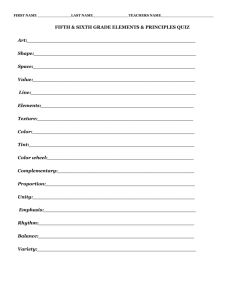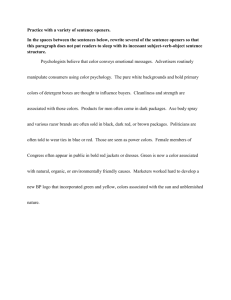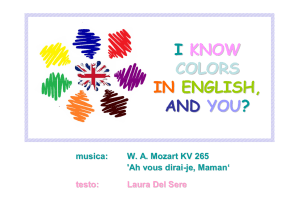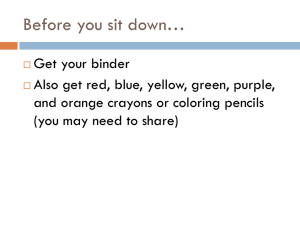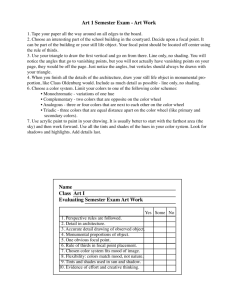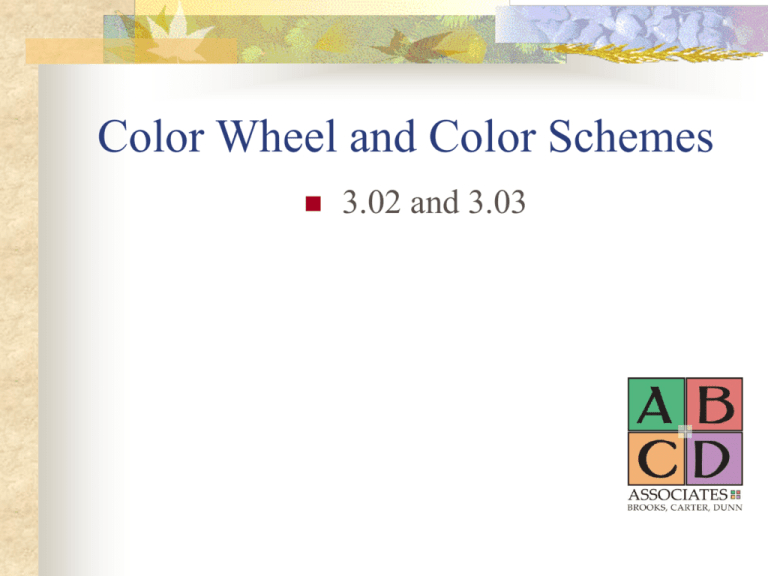
Color Wheel and Color Schemes
3.02 and 3.03
Color
Color is an element or property of light.
Can help create different moods in the
residential and non-residential setting.
Every color can have a psychological effect
on people and no one single color can
satisfy every member of the family
Color Wheel
Most commonly used tool to understand
the basis of all color relationships.
3 concentric rings make up the color wheel:
outer, middle, inner. The middle ring
consists of the primary, secondary, and
intermediate/tertiary colors.
Color Wheel
Primary Colors
Yellow, red, blue are the basic colors and
cannot be created by mixing other colors.
Secondary colors
Orange, green, violet. These are created by
mixing equal amounts of two primary
colors and are located on the color wheel
halfway between the two primary colors
used to make it.
Intermediate/Tertiary Colors
Made from using equal amounts of a
primary and secondary color. (Primary
color is always named first)
Yellow-green and Yellow-orange
Red-violet and Red-orange
Blue-green and Blue-violet
Intermediate Colors
Yellow-orange
Yellow-green
Red -orange
Blue-green
Blue-Violet
Red-Violet
Student Project Wheel
Color Terminology
Hue – The name of a color
Intensity- The brightness or dullness of a
color
Value- The lightness or darkness of a
color
a.Shade- adding black to a color
b. Tint- adding white to a color
Warm and Cool Colors
Warm colors: yellow, red, orange and all of the
colors near them.
These color are called “advancing” because they
make appear closer.
These colors attract your attention and make you
feel happy, energetic and excited.
Red actually stimulates the nervous system.
Overuse of these colors can make you feel
nervous or tense.
Cool Colors: blue, green, violet and all
colors near them.
Remind you of water, grass, and trees.
Called “receding” colors because they
make objects seem smaller and further
away.
Cool colors are quiet and restful. Used in
hospitals and bedrooms.
Color Schemes or Harmonies
Pleasing combinations of colors based on
their respective positions on the color
wheel.
There are 6 basic color schemes/harmonies
Monochromatic
Simplest color scheme.
Uses a single hue and variation is created
by changing the values and intensities
Analogous
3-5 color that are next to each other on the
color wheel.
Choose one color as the dominant and use
smaller amounts of the others to add
interest and variety
Complementary
Two colors that are positioned across from
each other across on color wheel.
They make each other look brighter and
more intense.
Split-Complementary
One color is used with the two colors
adjacent to it complement.
One color should be dominant and the
other two used to add variety and interest.
Triadic
Uses three colors that are equally spaced on
the color wheel
The primary and secondary colors form
separate triadic schemes
Change values and intensities to lessen the
sharp contrasts.
Neutral
Combinations of black, white, gray form
this scheme.
Can also add brown, tan, beige
Small amounts of color may be added for
interest. This is called “accented” neutral
Resources
Housing Decisions, pages 253-270
Housing and Interiors, pages 406-421
www.colormatters.com/colortheory
www.color-wheel-pro.com
Copyright ©2007, ABCD, All rights reserved

